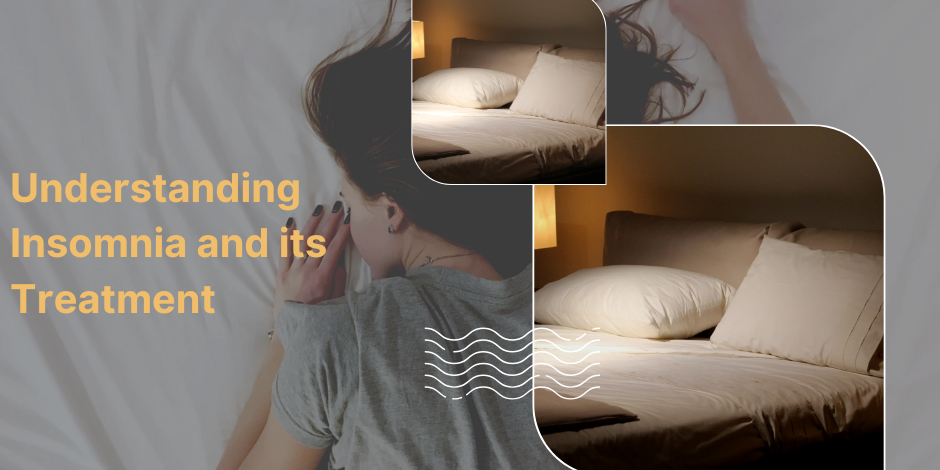Insomnia is a common sleep disorder characterized by difficulty falling asleep, staying asleep, or experiencing restful, quality sleep. This condition can disrupt daily life and impact overall well-being, leading to various physical, emotional, and cognitive challenges. Understanding insomnia’s different types, symptoms, causes, and treatments is crucial for those seeking help.
Different Types of Insomnia
Insomnia can manifest in various forms, depending on its duration and the underlying triggers. The primary types of insomnia include:
- Acute Insomnia:
Acute insomnia is short-term and typically lasts for a few days or weeks. It is often triggered by specific life events, such as stress, anxiety, or changes in routine (like jet lag or work schedule shifts). While the sleep disturbance is temporary, it can still significantly affect daily functioning. - Chronic Insomnia:
Chronic insomnia occurs when sleep disturbances persist for at least three nights a week for three months or more. A combination of medical conditions, mental health disorders, or poor sleep habits can trigger this type of insomnia. It may require ongoing treatment and lifestyle adjustments. - Comorbid Insomnia:
Comorbid insomnia refers to insomnia that occurs alongside another health condition. This could include conditions like depression, anxiety, or chronic pain. In such cases, the insomnia might be secondary to the primary illness, complicating the treatment approach. - Transient Insomnia:
Transient insomnia is a temporary form of insomnia that lasts only for a short period, usually less than a week. Stress, excitement, or changes in routine are common triggers. Once the triggering event resolves, sleep patterns typically return to normal.
Recognizing the Symptoms of Insomnia
The symptoms of insomnia vary, but common signs include:
- Difficulty Falling Asleep:
Individuals with insomnia often find themselves lying awake for extended periods before falling asleep, sometimes due to racing thoughts or anxiety. - Frequent Waking During the Night:
Insomniacs may wake up multiple times throughout the night, struggling to return to sleep even after short periods of rest. - Early Morning Awakening:
Waking up too early and being unable to fall back asleep is another frequent symptom. This often leads to a feeling of insufficient rest upon waking. - Daytime Fatigue:
As a result of poor quality or insufficient sleep, people with insomnia often feel excessively tired and lethargic during the day, which can affect their productivity and mood. - Cognitive Impairment:
Lack of sleep can impact concentration, memory, and decision-making, making it difficult to perform daily tasks. - Mood Changes:
Irritability, anxiety, and depression are commonly associated with chronic insomnia due to the strain it puts on an individual’s mental and emotional health.
Common Causes of Insomnia
The causes of insomnia are diverse and can include physical, psychological, and environmental factors. Some common causes include:
- Mental Health Disorders:
Conditions like depression, anxiety, and PTSD can significantly disrupt sleep patterns. The stress associated with these disorders often leads to racing thoughts and difficulty relaxing at bedtime. - Physical Illnesses:
Chronic pain, asthma, arthritis, and other medical conditions can interfere with sleep. In addition, sleep disorders such as sleep apnea may be linked to insomnia. - Medication and Substances:
Certain medications, such as antidepressants, stimulants, or corticosteroids, can interfere with sleep. Additionally, alcohol, caffeine, and nicotine are known sleep disruptors. - Stress:
Life events such as job changes, financial problems, or relationship issues can increase stress levels, which in turn can cause short-term or chronic insomnia. - Poor Sleep Habits:
Irregular sleep schedules, excessive screen time before bed, and an uncomfortable sleep environment can contribute to insomnia. These habits disrupt the body’s internal clock, making it difficult to establish a healthy sleep routine. - Hormonal Changes:
Hormonal shifts during pregnancy, menopause, or menstruation can influence sleep quality. In particular, fluctuating levels of estrogen and progesterone can make it harder for women to maintain consistent sleep.
Treatment Options for Insomnia
While insomnia can be a persistent problem, several treatment options are available to help manage and alleviate the symptoms:
- Cognitive Behavioral Therapy for Insomnia (CBT-I):
CBT-I is considered the most effective non-pharmacological treatment for chronic insomnia. This structured therapy helps individuals identify and change negative thoughts and behaviors related to sleep, improving sleep quality over time. - Medications:
Prescription medications such as Ambien (zolpidem), Lunesta (eszopiclone), or Rozerem (ramelteon) may be prescribed for short-term use. These medications help initiate and maintain sleep but should be used under medical supervision to avoid dependency. - Over-the-Counter Sleep Aids:
OTC sleep aids, like diphenhydramine (Benadryl), may offer temporary relief. However, they can cause grogginess and may not address the underlying cause of insomnia. - Sleep Hygiene Practices:
Good sleep hygiene includes maintaining a regular sleep schedule, creating a comfortable and quiet sleep environment, and avoiding stimulating activities before bedtime. This is often the first line of defense against insomnia. - Relaxation Techniques:
Techniques such as meditation, deep breathing, or progressive muscle relaxation can help calm the mind and body before bed, improving the chances of falling asleep. - Lifestyle Changes:
Regular exercise, reducing caffeine intake, and managing stress can have a positive effect on sleep patterns. Making these changes can support long-term sleep health.
Who is Most at Risk for Insomnia?
Insomnia can affect people of all ages, but certain groups are more likely to experience it:
- Older Adults: Aging often brings changes in sleep patterns, including difficulty falling asleep or staying asleep.
- Women: Women, especially those undergoing hormonal changes (e.g., pregnancy or menopause), are more likely to experience insomnia.
- Individuals with Mental Health Disorders: Conditions like depression, anxiety, and PTSD often co-occur with insomnia.
- Chronic Illness Sufferers: Those with chronic medical conditions such as diabetes, hypertension, or heart disease may have an increased risk of developing insomnia.
- Shift Workers: People who work night shifts or irregular hours may struggle with sleep due to disruptions in their circadian rhythms.
How to Know if You Have Insomnia
If you frequently experience difficulty falling asleep, staying asleep, or feeling excessively tired during the day, you may be suffering from insomnia. A healthcare professional can help diagnose the condition based on your sleep history, symptoms, and overall health. They may recommend a sleep study or other evaluations to determine the cause and appropriate treatment for your insomnia.
Conclusion
Insomnia is a pervasive condition that affects many people globally, leading to significant distress in daily life. Understanding its types, symptoms, and underlying causes is essential for effective treatment and management. With the right combination of lifestyle changes, therapy, and possibly medications, it is possible to overcome insomnia and enjoy restful, restorative sleep. If you’re struggling with sleep disturbances, don’t hesitate to consult a healthcare provider to find the best approach for your situation.






